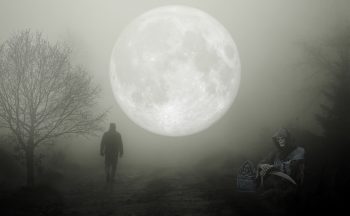How about Polish horror movie marathon before Halloween? Posted by Kasia on Oct 28, 2019 in Culture
It is the season for scary movies for sure! Some of us love them, others hate these scary movies…So why exactly do we like watching horror movies?
We have four basic emotions: happiness, sadness, anger, and fear. Fear is there to keep us alive and we need it!
So if you are the person who is into horror movies, here you will find ideas what Polish horror movies to watch before Halloween!
1. Lokis Rękopis profesora Wittembacha (often called simply Lokis) is a 1970 Polish horror film directed by Janusz Majewski. The title is a misspelling of the Lithuanian ‘lokys’, meaning “bear”. Based on a novel by the French author Prosper Mérimée, this is a carefully crafted piece of work, sombre and brooding, which downplays the more lurid possibilities of its subject and concentrates on character and setting. Thanks to the opulent mansion location and lush surrounding countryside it’s consistently beautiful to watch, and director Janusz Majewski creates a number of striking sequences making full use of the locale, through autumn into winter.
An emotionally withdrawn cleric, Professor Wittembach (Edmund Fetting), studying arcane ecclesiastical texts at a remote Lithuanian country house, comes to believe local superstition about his aristocratic young host, the oddly intense Count Michael Szemiot (Józef Duriasz). Rumour has it that the Count, whose mother (Zofia Mrozowska) was mauled by a wild bear during pregnancy, was born only half-human, a possibility that seems more and more compelling as a number of strange events occur in the weeks before the Count’s wedding…
You can actually watch this movie on YouTube:
https://www.youtube.com/watch?v=HP-Ctpy9fQI&t=12s
2. Another Polish horror would be “Demon” by Marcin Wrona. “Demon,” a joint Israeli-Polish production, was filmed in a small village near the town of Bochnia in southern Poland.
Movie is about a wedding that gets interrupted after the groom becomes possessed by a Jewish “dybbuk” (a cross between a vampire and a ghost), is a paradoxically heavy movie with a deceptively light tone. Israeli actor Itay Tiran portrays a young British man who arrives in a remote Polish village to marry the Polish woman he loves. Shortly before the wedding he discovers human bones in the ground, a disturbing remnant of Jewish life that had been severed a few decades earlier. The bones haunt him, entering his body and turning his merry, vodka-soaked wedding into a horror spectacle – albeit partly comical.
While many contemporary horror films use jump scares and gore to shock viewers out of complacency, “Demon” makes horror touchstones, like a disembodied child’s hand emerging from under the bed, seem relatively normal. Or, put another way: the horrors of “Demon” are disturbing because you can see how ordinary they might seem to anyone who isn’t paying enough attention.
Here is a movie trailer:
Unfortunately, director Wrona took his own life few months after the movie hit the screens…He was born in 1973 in Tarnów, Poland, half of population there was Jewish on the eve of World War II; they were murdered in Auschwitz, Bełżec, Plaszów and in forests near the town. Wrona’s violent father, who beat his wife and tormented his children, made his living as an exorcist. As a child, Marcin used to watch him in action.
He was invited as a guest of honor to the film’s debut in Israel, at the Haifa Film Festival, but he never arrived. His young widow had to come to the Haifa Festival alone, accepting in his name a prize in the category called “Between Israeli and Jewish.”
3. “Haunted Poland” (Nawiedzona Polska) is a movie based on a true story…
The actual tape of a couple who travel to Poland but find themselves disturbed by an evil force when the girl returns to her home town where she once played a Ouija board. All the video and audio comes from a handheld camera.
Ewelina and Pau are a mid twenties couple residing in the USA. Ewelina being a Christian and Pau an atheist. One summer, they travel to Europe, ultimately visiting Chodecz, Poland, where the girl was born. At first, things are going great. Ewelina gets to see her grandmothers and relatives, and visits the graveyard where her parents are buried. As the week goes by, strange phenomena starts to occur. The couple will find themselves threatened, not only at a relationship level, but also to fear for their lives.
https://www.youtube.com/watch?v=tpWhuVigDZk
4. “The third part of the night” (Trzecia część nocy) is another movie I would recommend. This highly influential award-winning film, set during the time of the Nazi occupation of Poland, is rich with multilayered apocalyptic imagery and symbolism. Even though the film won an award for best debut in Poland, distribution was halted there by the authorities, and the director was viewed with suspicion.
The film begins as a young man narrowly escapes the massacre in which his family is annihilated. He makes his way into town where he is nearly captured, but another man wearing clothes similar to his own is taken in insted. After taking refuge in the home of a pregnant young woman who closely resembles his dead wife, he helps her with the birth of her child. While working in a typhus center, as someone who is repeatedly infected with the disease in order to produce vaccines for others, he experiences many hallucinations and does some bizarre things while seeking to come to grips with his traumatic life and the guilt he feels for being alive when all who knew him are dead.
I hope these four horrors will be enough for you, but in case you are looking for more scary Polish movie, take a look at these titles:
“Alchemik” by Jacek Koprowicz
“Noc Walpurgi” (Walpurgi’s night) by Marcin Bortkiewicz
“Wróbel” (Sparrow) directed by Shaun Troke, written by Matthew Mosley and Justin Di Febo, and produced by independent filmmaker Wojciech Stuchlik.
Each person has a different response to horror films. Some get a thrill, while it is nothing short of torture for others. It all depends on the individual brains and their ability to process fear. As a result, watching horror films can be equated to sharpening how you deal with fear and scary situations.
I think that a little thrill now and again is good for our physical, mental and emotional health! Have fun!

Build vocabulary, practice pronunciation, and more with Transparent Language Online. Available anytime, anywhere, on any device.





